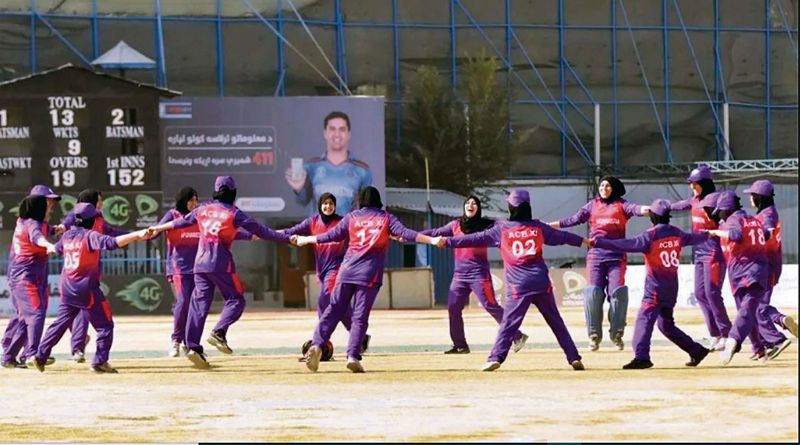
Afghan women cricketers in happier days. They are unlikely to be allowed to play the game.
Rohit Mahajan
SHOULD women be allowed to play sport? Is it necessary that women should play sport? In the civilised world, anyone who uses the words ‘allow’ and ‘necessary’ in the context of women in sport — or any other field of human endeavour — would be considered an idiot not fit to be taken seriously.
But not too long back, such retrograde attitudes were mainstream even in the western world. Due to their perceived fragility, for a long time women were not allowed to compete in supposedly hardy sports — women got into the Olympic Games boxing only nine years ago and ran the Olympics marathon for the first time only 37 years ago. In 1896, when women were completely barred from the inaugural Olympics in Athens, a Greek woman, Stamata Revithi, was determined to run — a day after the men’s marathon, for which she was ineligible, she ran the marathon on her own. The reward for her effort was that she was not allowed to enter the Panathinaiko Stadium, an ancient sporting site refurbished for the Olympics.
It took 88 more years for women to be allowed to run the marathon in the Olympics. In between, European nations gave freedom to their colonies, the human rights movement gained ground, the American Civil Liberties Act was passed, and women were beginning to be regarded as autonomous beings. Incrementally, across the world, they were given the right to vote, Switzerland granting them this right at the federal level only in 1971, seven years after Afghanistan!
But women couldn’t run the marathon. At the Boston Marathon of 1967, a woman called Kathrine Switzer registered as KW Switzer and completed the race, despite an official making an attempt to eject her physically as she ran — luckily, Kathrine’s boyfriend managed to shove the official out.
The New York Marathon welcomed women from the inaugural race in 1970. The European Championships included the women’s marathon in its programme for the first time in 1982, and two years later the Olympics did the same, at Los Angeles 1984. Women cyclists also debuted at the Olympics that year. Before that, at 1952 Helsinki, women were allowed to compete in equestrian for the first time at the Olympics; they were allowed to compete in shooting for the first time at Mexico City in 1968, and in 1976 Montreal, women’s basketball and handball made their debuts. Inch by inch, sport by sport, women were ‘allowed’ to compete by committees that comprised mostly men.
This year’s Tokyo Olympics were the first gender-equal Olympics in history, with nearly 49 per cent of contestants being women. The percentage was 45.6 at Rio de Janeiro 2016 and 44.2 at London 2012. Leading sporting nations such as China, United States, Australia, Britain and Canada had more women than men in their contingents.
Backward step
In the same year as the Tokyo Olympics, thus, a country deciding to altogether ban women’s sport seems nothing short of madness. Unsurprisingly, Afghanistan is that country — the same country whose women in 1964 were involved in the drafting of a new Constitution that gave them the right to vote and seek election to public office. Their right to vote — and to run and laugh, sing and dance, and go out with their face uncovered — was taken away when Taliban ruled the country from 1996 to 2001. The relief lasted barely two decades. Women who loved playing cricket or football now must retreat into the confines of their home, and stir out only with a male guardian.
A Taliban official recently said: “I don’t think women will be allowed to play cricket because it is not necessary that women should play cricket.”
Imagine a woman from Australia — probably the world’s most sporty nation — not being allowed to play sport because it was not necessary; being forced to withdraw from sport and society. It’s no surprise, then, that Cricket Australia (CA) is the first sporting entity to express outrage at Taliban’s proposal to ban women from cricket — CA has said it won’t host Afghanistan’s men’s team for a Test match scheduled later this year.
Men, using scripture and religion and tradition, try to curtail women’s autonomy and liberty. They cite divine sanction to suppress women — Shahid Afridi, for instance, has said he won’t allow his daughters to play cricket or other outdoor sports due to ‘social and religious reasons’.
Eventually, secular ideas, free from dogma, will beat primitive notions regarding gender inequality in sport. Until then, sadly, far too many women would have endured far too much suffering.
Join Whatsapp Channel of The Tribune for latest updates.




























